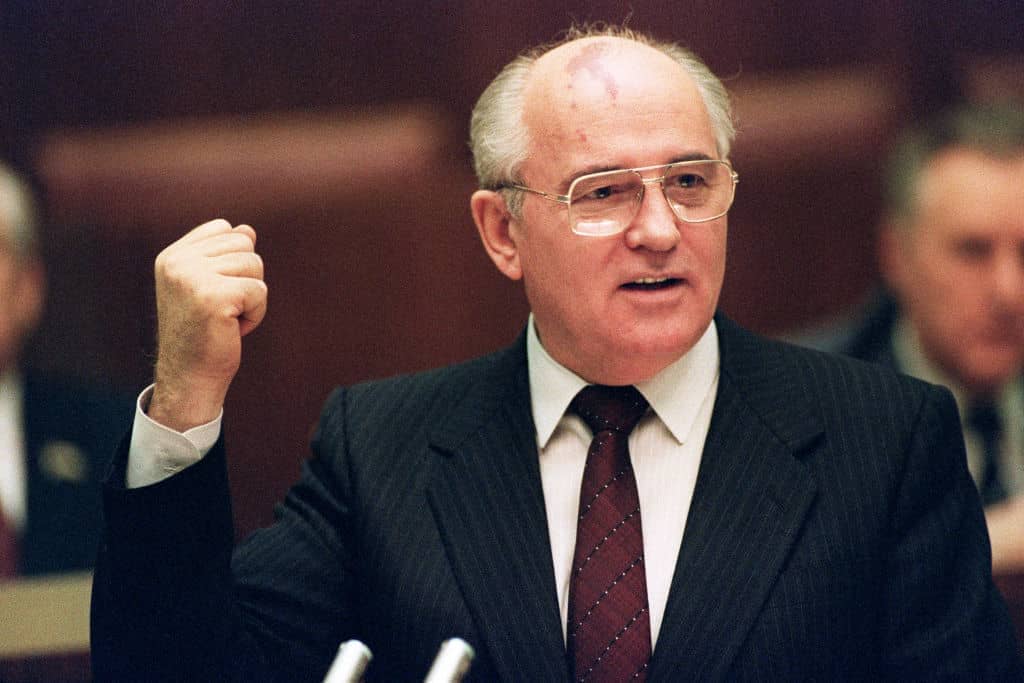Mikhail Gorbachev’s legacy will forever centre around his successful, albeit far from painless, promise to open the USSR, and Russia, to the rest of the world. He brought about the end of the Cold War, allowing the West to breathe a collective sigh of relief.
However, my debt to him is more personal. For without Gorbachev, I almost certainly would not exist.
Gorbachev’s accession as eighth, and final, leader of the Soviet Union in 1985 marked a turning point in the country’s history. The politicians who chose him could hardly have predicted quite what his rule would entail. Immediately, Gorbachev set about rejuvenating the country: his policies of ‘perestroika’ and ‘glasnost’ oversaw economic, political and societal reforms that were unprecedented in the USSR’s 70 year history.
His decision to open up the Soviet Union, encouraging freedom of expression, curbing censorship, hesitantly embracing a market economy, enthralled the West. While suspicious of Gorbachev, western leaders saw the potential that bringing the then-still USSR into their fold could yield. Indeed, some were even ahead of the curve: on a visit to London as a rising star of the Politburo in 1984, Thatcher recognised Gorbachev as ‘a man one could do business with’.
To Western students, the Soviet Union Gorbachev was creating was the future, the land of untapped opportunity
This is where my story begins. Gorbachev’s launch of reforms in the Soviet Union, and the wave of western interest it generated coincided with my parents’ teenage years. My dad, a keen linguist from the Midlands, had won a place at Cambridge to study French and German in 1987. Unimpressed with the French professor who’d interviewed him, and fuelled by several beer-filled conversations with Slavophile friends that had sparked an interest in the mysterious unknown of Russia, he made the decision to switch to Russian at the start of his first year.
To western students like my dad, the Soviet Union Gorbachev was creating was the future, the land of untapped opportunity. Before his rule, relations between the USSR and the West had been conducted under the heavy cloud of the Cold War – the threat of nuclear armageddon and mutually assured destruction hardly fostering an atmosphere of mutual cooperation. With Gorbachev, the study of Russia, its culture and language, became quite appealing: his reforms drew large numbers of cultural and educational exchanges and the number of students studying Russian at western universities surged.
At the end of his first year at university, on a trip to the Soviet Union in the summer of 1988 to practise the language, my dad met my mum in her home city of Minsk. The descent of the Iron Curtain allowed my mum to travel to Britain for the first time in 1990 and the rest, as they say, is history. But my parents were hardly unique.
Gorbachev’s decision to thaw relations with and draw closer to the West presented Russians with unprecedented opportunities to experience life beyond the Iron Curtain. Many followed his lead, looking outward, doing business with and establishing lives and homes with westerners, cementing themselves as members of a broader, international community.
Of course, Gorbachev’s legacy is not recognised so favourably in Russia as abroad. Perestroika and glasnost led to a period of significant turbulence for Russians, plunging many into economic hardship that took years to recover from. Putin, too, had a role in how the dissolution of the Soviet Union and ensuing decade are viewed by Russians.
Against the backdrop of Putin’s invasion of Ukraine, Gorbachev’s death at the age of 91 seems particularly poignant. From the beginning of Putin’s rule, Gorbachev was suspicious of his intentions for Russia. The former Soviet leader was said to have been greatly upset by the February invasion: a direct attempt to reverse the dissolution of the Soviet Union – in Putin’s eyes ‘the greatest geopolitical catastrophe of the century’ – that Gorbachev had brought about.
Gorbachev lived long enough to see Putin undo many of his liberalising reforms, destroying freedom of expression in the country, reviving the Gulag system in all but name and allowing the economy to descend into corrupt stagnation. The thaw with the West that Gorbachev strove to achieve lies in tatters as Putin’s war has once more plunged the relationship between Russia and the West into the deep freeze.
With sanctions in full swing, travel to Russia nearly impossible and a reevaluation of Russian identity, the mutual curiosity and appreciation for each other’s cultures has been damaged. Through a relentless Kremlin campaign of isolationism, Russians are being told to look inwards, not out, to reject the West and trust only themselves. It only follows that fewer students will do as my dad and his generation did and choose to study the culture or language.
While the West mourns Gorbachev’s passing, it should also serve as a reminder of the potential relations between Russia and the West once held. The memory of partnership, hope and opportunity that once existed is what we must draw on as we continue to support Ukraine in its fight for freedom, as well as when we start to look towards what a relationship with Russia in its aftermath may look like. I, for one, know just how important that could be.







Comments